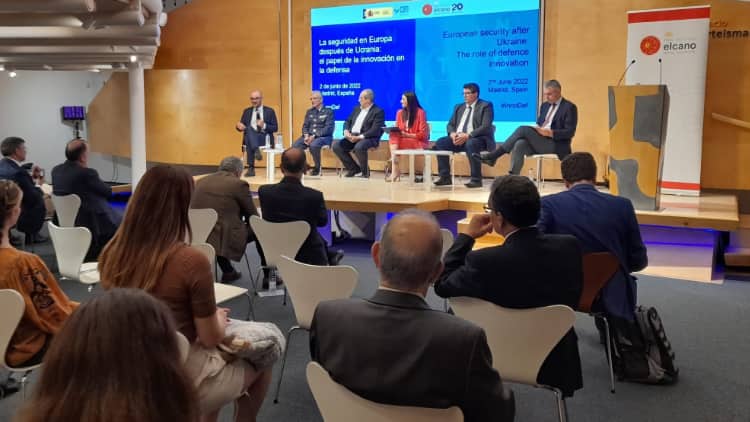Marta Martínez
Innovation in defence and security has become fundamental in the aftermath of the Ukraine crisis, according to a debate with experts in technology and armaments organised by the Elcano Royal Institute.
In the debate, held last Thursday, which analysed security in Europe following Russia’s invasion of Ukraine, Juan Carlos Cortés, Director of Space, Large Installations and Dual Programmes, Centre for the Development of Industrial Technology (CDTI), pointed out that the Ukrainian crisis has called globalisation into question and has demonstrated how fundamental multilateralism is in resolving the complex situations facing the Old Continent.
For his part, Juan Manuel González del Campo, Director General of Armaments and Material at the Ministry of Defence, underlined the fundamental role that innovation will play in terms of security and defence, because it implies modernising and being ahead of the adversary in these matters. He explained that the use of mature technologies for new challenges is important in all defence-related fields, most of which involve industrial sectors.
According to Del Campo, innovation involves a threefold perspective. On the one hand, the challenges of military capabilities to achieve operational superiority should their use be necessary. From the technological point of view,” he said, “sovereignty in order to be able to have the technologies and use them without any problem when necessary. And finally, the industrial technological base in the field of defence.
The strategy,” he added, “is an instrument for tackling technology and innovation jointly and, in order to innovate, there is a system of innovation and technological prospecting that analyses the opportunities that exist, both internationally and nationally”. Del Campo emphasised the importance of collaboration between all Spanish science, technology and innovation agents.
Also speaking on collaboration was Lauren M. Speranza, Director of the Transatlantic Defence and Security Programme at the Center for European Policy Analysis (CEPA), who pointed out that there are numerous barriers in terms of international cooperation, as there is a tendency to prioritise economic gains over the common good. She stressed the importance of working together with non-traditional partners due to the lack of technology experts in current governments.
Speranza also stressed the importance of information sharing. “Governments often have a closed door on this, to protect their technology, but this only leads to national interest over collective advantage,” she said.
Daniel Fiott, editor of Security and Defence at the European Union Insitute for Security Studies (EUISS) pointed out that innovation was already being discussed in Europe before, but this need has been increased by the latest security crisis.
He indicated that, at the EU level, there are already several initiatives that address the importance of investment in technology to contribute to innovation in defence and security. The same applies to cooperation between the EU and NATO.
Juan Carlos Cortés agreed with Fiott on this point, adding that, in primary matters alone, dependence on Russia is enormous. However, he said, both operations and EU space collaboration issues involving Russia have been terminated and suspended since the invasion of Ukraine.
Cortés highlighted two important factors to consider: how much the direct impact of the Ukrainian crisis will cost, and how much European dependence will cost in the future.
As Speranza pointed out, the need to have member states present in the defence innovation process must not be lost. Moritz Zimmerman, Senior Policy Officer, Innovation Unit, NATO’s Emerging Security Challenges Division, agreed with his colleague when he explained that one of the main reasons Ukraine has been successful against Russian troops is because of new technologies.
However, Fiott raised questions about how these EU technologies will be applied to real-life problems and where the balance will be struck between investment in Ukraine’s war and the need to modernise our armed forces.





